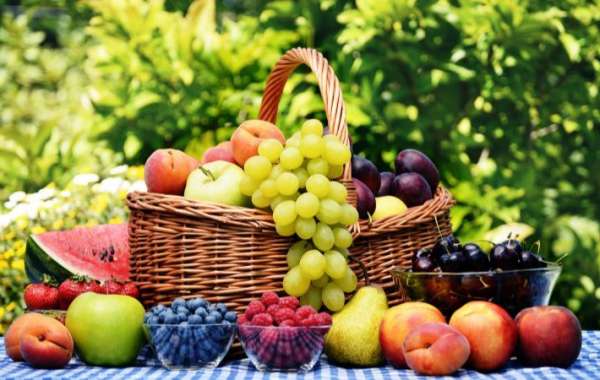The global Fruits Market Size is a dynamic and rapidly growing sector, reaching a value of USD 596.49 billion in 2023. Driven by health-conscious consumer demand, technological advancements in farming, and changing food consumption patterns, the market is expected to experience steady growth over the forecast period of 2024-2032 at a CAGR of 3.5%. As consumers seek nutritious, fresh, and organic fruits, opportunities for further market expansion are significant. However, the market is not without challenges, including supply chain constraints and fluctuating environmental conditions that impact production.
Key Benefits of the Fruits Market:
Health and Wellness: Fruits are an essential part of a balanced diet, offering vitamins, minerals, antioxidants, and dietary fiber. As awareness of healthy eating grows, consumers are turning to fruits for better health outcomes.
Sustainability and Environmental Impact: The market for organic fruits is increasing as consumers prioritize eco-friendly and sustainable agricultural practices. This benefits both the environment and the health of consumers.
Economic Growth for Farmers and Producers: The expanding demand for fruits globally supports local economies by providing income for farmers and fostering job creation in production, distribution, and retail.
Technological Advancements: From precision agriculture to genetically improved varieties, innovations in fruit cultivation have enhanced productivity and reduced losses due to pests and environmental challenges.
Export Opportunities: The growing global demand for exotic and off-season fruits has boosted international trade, offering significant opportunities for market expansion, especially for emerging economies.
Key Industry Developments:
Vertical Farming and Controlled Environment Agriculture (CEA):
Technologies like vertical farming and CEA have revolutionized fruit cultivation. They enable farmers to grow fruits in controlled environments, enhancing yield and reducing dependence on seasonal cycles.Organic Fruit Production:
The demand for organic fruits continues to surge, with industry players investing in organic farming methods. The rise of eco-conscious consumers is fueling growth in this segment.Supply Chain Innovations:
Cold chain logistics advancements are ensuring that fruits are transported across regions with minimal spoilage, improving distribution efficiency and reducing waste.Sustainability Initiatives:
Companies are adopting sustainable packaging solutions, such as biodegradable packaging, to cater to environmentally conscious consumers.
Driving Factors:
Rising Health Awareness:
The increasing emphasis on health and wellness has led to a higher consumption of fruits, which are considered vital for a healthy lifestyle. This trend is a key driver for the global fruits market.Urbanization and Changing Lifestyles:
As urbanization grows, consumers in developing regions are becoming more inclined toward healthier food options, including fruits. This shift is a crucial growth driver in regions like Asia-Pacific and Latin America.Increased Demand for Processed and Packaged Fruits:
The convenience of ready-to-eat fruit products, such as dried, frozen, or canned fruits, is driving demand, particularly among busy urban populations.Technological Advancements in Agriculture:
The adoption of modern agricultural technologies such as drip irrigation, hybrid seeds, and advanced pest control methods has significantly improved fruit production, meeting the growing consumer demand.
Restraining Factors:
Climate Change and Unpredictable Weather Patterns:
Fluctuations in weather conditions, including droughts and floods, negatively impact fruit yields, posing a major challenge for the global fruits market.Supply Chain Disruptions:
Fruit supply chains are highly perishable, and disruptions caused by transportation inefficiencies or labor shortages can result in significant losses.High Costs of Organic and Exotic Fruits:
While demand for organic fruits is rising, their higher cost limits accessibility for a broad consumer base, especially in price-sensitive markets.Pesticide Use and Environmental Concerns:
The extensive use of pesticides in conventional farming raises health and environmental concerns, leading some consumers to shy away from non-organic fruits.
Market Segmentation:
By Product Type:
- Citrus Fruits (Oranges, Lemons, Limes, etc.)
- Berries (Strawberries, Blueberries, Raspberries, etc.)
- Tropical and Exotic Fruits (Mangoes, Pineapples, Bananas, etc.)
- Pome Fruits (Apples, Pears, etc.)
- Stone Fruits (Peaches, Plums, Cherries, etc.)
- Others (Grapes, Melons, etc.)
By Distribution Channel:
- Supermarkets and Hypermarkets
- Specialty Stores
- Online Retail
- Convenience Stores
By Nature:
- Organic
- Conventional
By Form:
- Fresh
- Frozen
- Canned
- Dried
Market Outlook
The global fruits market is expected to continue its steady growth trajectory over the forecast period. Increasing awareness of the health benefits associated with fruit consumption, combined with the rising demand for organic and exotic fruits, will be key contributors to market expansion. The availability of diverse fruit varieties, advancements in farming technologies, and improved cold storage logistics will also support growth. However, the market will face challenges due to the ongoing impacts of climate change and rising production costs.
Top Impacting Factors
Health Awareness:
The shift towards healthier eating habits is a major factor driving fruit consumption worldwide.Technological Advancements:
The adoption of innovative farming techniques is helping improve fruit yields and reduce losses due to pests and climate change.Consumer Preferences:
Changing consumer preferences towards exotic and organic fruits continue to drive market growth.
Target Audience
- Retailers and Supermarkets
- Fruit Growers and Producers
- Organic Farming Enterprises
- Cold Chain Logistics Providers
- Consumers seeking healthy, sustainable food options
Major Key Players
- Dole Food Company Inc.
- Del Monte Foods Inc.
- Chiquita Brands International Sàrl
- Greenyard NV
- Sunwest Fruit Company
- Others
Opportunities
Expansion in Emerging Markets:
The growing middle class in emerging economies presents significant opportunities for market players to expand their operations and product offerings.Development of Value-Added Products:
Processing fruits into snacks, juices, and other value-added products provides lucrative opportunities for manufacturers.
Challenges
Perishability:
The highly perishable nature of fruits presents logistical challenges, requiring efficient cold storage and transportation solutions.Environmental Impact:
Sustainable fruit production practices are increasingly important, with consumers demanding lower carbon footprints and reduced water usage in farming.




